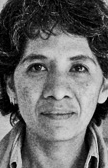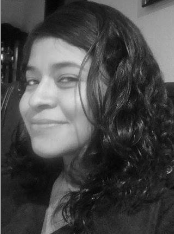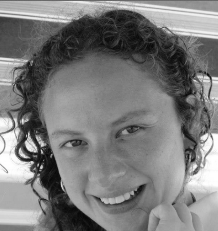|
Mexico D.F. - 4 Women Journalists Defying the Odds in Mexico CityWritten by Andrea Arzaba (Globalvoices) - 24 December 2013 This post is part of our series on gender and sexuality in Latin America and the Caribbean in collaboration with North American Congress on Latin America (NACLA). Despite the low salaries and the dangers that come with being a reporter in the most dangerous country for journalists in the Americas

Despite the low salaries and the dangers that come with being a reporter in the most dangerous country for journalists in the Americas, some Mexican female journalists continue working and thriving in this profession. In this post, we introduce you to four of these brave female journalists. With anecdotes about migration, politics, dreams and gender equality, these reporters have given us a glimpse into their lives to see what it's like to be a female journalist in Mexico City. Nicole Medgenberg Nicole, a journalist born in Germany, moved to Mexico City when she was starting her bachelor's degree. Today, she works for a non-governmental organization during the day, and at night she works as a freelance journalist covering mainly food and travel. She also started her own recipe blog, called La cocinera con prisa [es] (“A cook in a hurry”). Her first encounter with journalism happened at age 12, when she designed a magazine with a friend. Nicole explains that her friend would look for pictures in magazines, while she wrote imaginary stories for each image. “I still keep that magazine with me”, she says proudly. Nicole says that Mexico City has given her the same opportunities given to any man: “I was born in a generation and within cultures in which I no longer question whether I can vote, study or practice my profession any different than men. I am fortunate to have German and Mexican roots, which [my parents] are very open and supportive with my career.” For her, the main problem journalism faces is low pay: “Some people need to understand that if they want someone who is dedicated and that has good experience, she or he should be treated as such, getting paid at the right time and [the right] amount. It is a profession that requires commitment and self-sacrifice, and sadly, it is not well paid”. Follow Nicole on Twitter: @NicMedgenberg Elia Baltazar
“I cannot say I've ever been subjected to any discrimination or preferential treatment for being a woman. I believe it has more to do with the consciousness of my own rights. I would not allow that to happen”, Elia replies when asked if she's been treated differently as a female reporter. Born and raised in Mexico City, Elia works as a freelance journalist. She starts her day between 4:30 and 5 a.m., when she dedicates 30 minutes to reading a book of her interest (she does not have time later). She then reads the news and prepares her daily schedule. At 10 a.m., she is already interviewing people and investigating possible stories. She stops working at 10 p.m. Elia always dreamed about being a journalist. She saw journalism as one of the most exciting jobs in the world, always relating it to far-away lands. During high school, she worked in her school's newspaper, and she got her first job as a journalist at age 18. In her work with the network Periodistas de a Pie, she writes with a human rights and gender perspective: “I always prefer to write from the perspective of equal rights for all, and I just emphasize gender when it is clear that there was a violation of women's rights”. In her organization, they opt not only to write about complaints, but also to find examples of success stories that break the tradition of victims’ misfortune and empowers citizens with their own success stories. Elia declares herself a feminist; although she's not convinced about all feminist theories, they are a part of her personal and professional growth. For her, the biggest challenge that journalists, both male and female, face in Mexico today are low salaries and labor conditions, “which make it difficult to do real investigations”. Follow Elia on Twitter: @eliabaltazar Sandra Apolinar
Originally from Toluca, a city 40 minutes from Mexico City, Sandra is the editor of the music and technology section at Swagger [es]. A normal day for her in the newsroom consists of editing the articles for the website. She also investigates topics to suggest them as possible stories for journalists on her team. “I am not a big fan of covering music scandals, things related to Justin Bieber or Miley Cyrus, but our audience is very interested in that and I have to write about it”, she confesses. Sandra wants to continue her career by reporting on sports. She is a big fan of the local football team Diablos Rojos, but she knows it might take more time to pursue a career as a woman in that field. Sandra knew she wanted to be a journalist since she was in high school. She says she always wrote for herself, and when she was 16 she started to feel interested in writing for others. For more than six years, she has been traveling every day from Toluca to Mexico City and back, and even if she doesn't live in the city, she says she feels from ‘DF’ and there is no other place she would rather work as a journalist. “The greatest challenge I see for journalists in Mexico City is that sometimes they forget to be truly objective, at least as much as they can. Journalism in Mexico will not have a big improvement if the ego of journalists keeps on growing”, she concludes. Follow Sandra on Twitter: @sandiapolinar Daliri Oropeza
“I always try to balance the voices I write about. If I have interviewed four men, I try to look for the same number of women. I like to bring justice to my texts in those matters”, Daliri explains. Born and raised in Mexico City, Daliri comes from a family that has worked in the circus industry for generations. She is the only journalist in her family, and she feels proud about it. Daliri has lived in many neighborhoods in Mexico City, from San Rafael to La Roma, from La Tabacalera to Buena Vista. She is in love with Mexico City, and even if she travels to other cities to study, she confesses that she will always come back to DF. “I am a woman who likes to experiment with her work. I want to try new things, and I am always looking for new stories, new voices to represent.” Sandra has written several stories about the indigenous people from southern Mexico in the state of Chiapas. For Daliri, trying to bring an equal number of male and female voices is her contribution to gender equality. “I am not a feminist, but I always want to write about women in my stories”, she says. One of her favorite and most recent stories looks at daughters of politicians who are also working in politics, an investigation she pursued to explore a “minority of a minority.” “There are differences between men and women when we talk about journalism. Sometimes some men think you can't do a good job as a reporter, but you should not let those comments affect your work. These people are ignorant”, she emphasizes, concluding that working as a journalist is her passion and that there's no other thing she'd rather be doing. |
ÉVÉNEMENTS

Alô !!! Tudo bem??? Brésil-La culture en déliquescence ! Un film de 1h08 mn
Photo extraite du film de Mario Grave - S'abonner sur notre canal Youtube pour avoir accès à nos films :
DERNIERS ARTICLES
- Aller à La Havane de Leonardo Padura
- Soli Deo Gloria , Jean-Christophe Deveney (auteur) et Édouard Cour (dessinateur)
- Chrissie Hynde "Duets Special":
- Diamond Little Boy » de Victor Dermo
- « Je suis le premier chien à avoir lancé un être humain »
- Robert Plant "Saving Grace"
- Flow (s) de Natacha Andrews
- La Cage aux Folles triomphe au Châtelet !
- Jean-Louis Aubert clôt en majesté sa tournée « 50 ans avec vous » à Paris La Défense Arena !
- Notre-Dame de Paris de Roland Petit souffle ses 60 bougies à l’Opéra Bastille !
VINTAGE & COLLECTIONS
 La reine-mère, le corbillard et .... les Who ! La reine-mère, le corbillard et .... les Who !Quel rapport entre la reine-mère, un corbillard et My Generation, tube fétiche des Who ? A première vue, aucun. Cependant, en y regardant de plus prés et en fouillant un peu dans le passé de Peter Townshend, on arrive à trouver un lien. Une histoire abracadabrantesque, digne de ce groupe hors-normes. La suite, ici. |
SORTIR À PARIS

Paris - jusqu'au 11 janvier 2026
« Le mystère Cléopâtre », jusqu'au 11 janvier 2026 à l'Institut du Monde Arabe.
C'est une exposition entre mythes et histoire sur la célèbre reine d'Egypte que propose l'Institut du Monde Arabe. Son nom et sa légende ont traversé les siècles : Cléopâtre VII a régné sur l'Egypte antique, il y a plus de 2 000 ans. La mythique souveraine de la dynastie des Ptolémées est l'une des figures les plus connues du monde antique, mais la réalité n'étaye pas toujours les nombreuses histoires que l'on raconte sur elle. Lire la suite, ici. |
BRÈVES
4e Conférence mondiale pour l'égalité femmes-hommes
Parus accueille les 22 et 23 octobre 2025 les représentants d'une quinzaine de nations pour la 4e Conférence ministérielle des diplomaties féministes qui vise à mettre en place une action mondiale face aux blocages et aux reculs des droits des femmes. |
Elvis Presley : un nouveau film-concert
Un demi-siècle après la dernière apparition scénique d’Elvis Presley, Baz Luhrmann proposera, en 2026, EPiC: Elvis Presley in Concert, un film-concert inédit rassemblant des images restaurées de la légendaire résidence de Las Vegas en 1970 et de la tournée américaine de 1972. |
L'iran facilite les opérations Transgenre
L'Iran combat le mouvement LGBT dans son pays mais favorise les opérations pour les étrangers qui désirent changer de sexe. Business is business ! |
Une guitare volée aux Stones vient de refaire surface
Une Gibson Les Paul Standard de 1959 volée aux Stones dans les années 1970 vient d’être retrouvée. L’instrument, qui appartenait à Mick Taylor, a été identifié dans une collection de 500 guitares récemment acquise par le Metropolitan Museum of Art de New York. |
Le buste de Jim Morrison enfin retrouvé !
Trente-sept ans après sa disparition, le buste de Jim Morrison, couvert de graffitis, a été retrouvé dans le cadre d’une autre enquête. Pour en savoir plus, ici. |
ARTICLES LES PLUS LUS
- Photos -Femmes nues du carnaval de Rio
- Avec « Erasme », Jordi Savall perpétue le dialogue interculturel
- Photographie ancienne : types, techniques, cotes et prix.
- Sandra Lienard, artiste pétillante d’un univers coloré !
- Guitares vintage, attention les prix !
- Comment était la Syrie avant la guerre ?
- Vhils, street artiste portugais explosif
- Vintage Hi-Fi Tendance
- Mythiques Ray-Ban
- Le Louvre, une excellente affaire financière
- Les cartes postales anciennes font toujours un carton !
- "Suivez-moi, je vais vous montrer les catacombes de Paris"
































